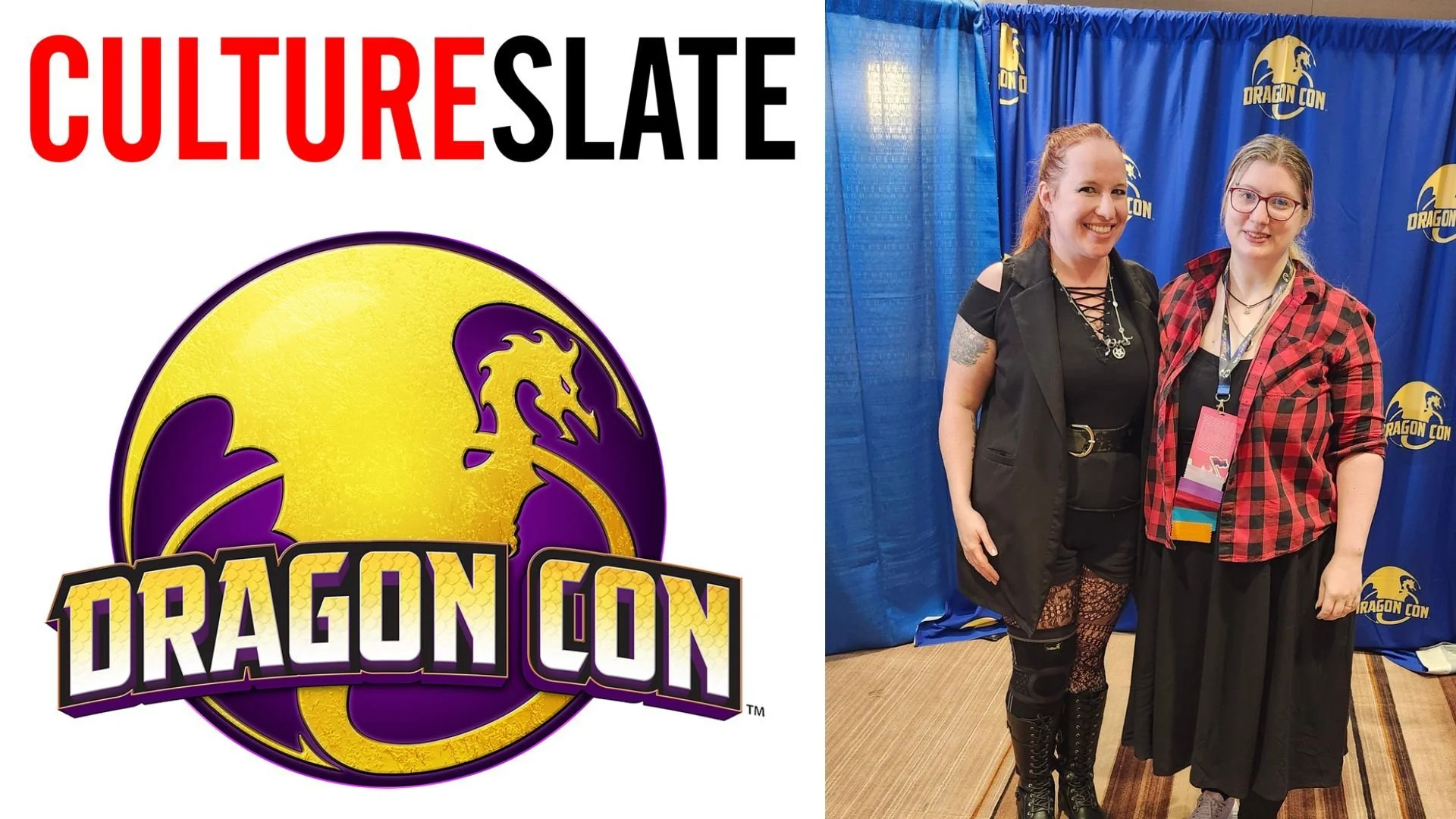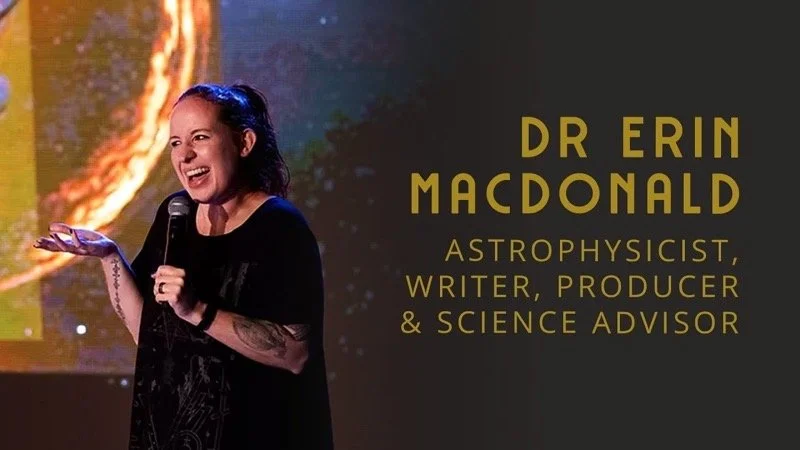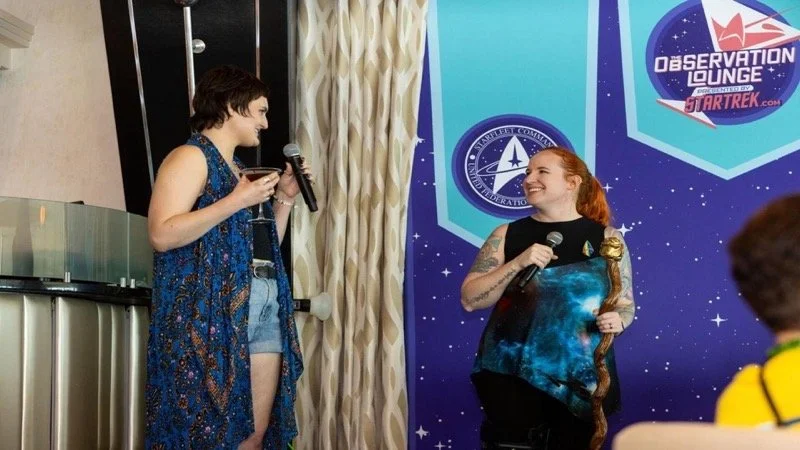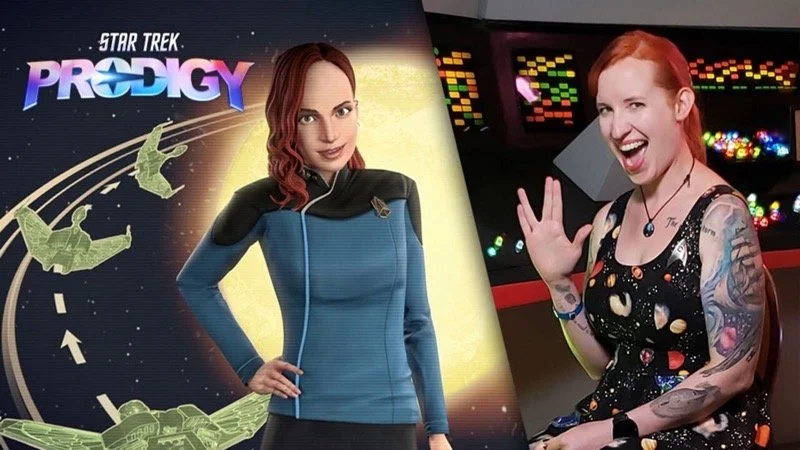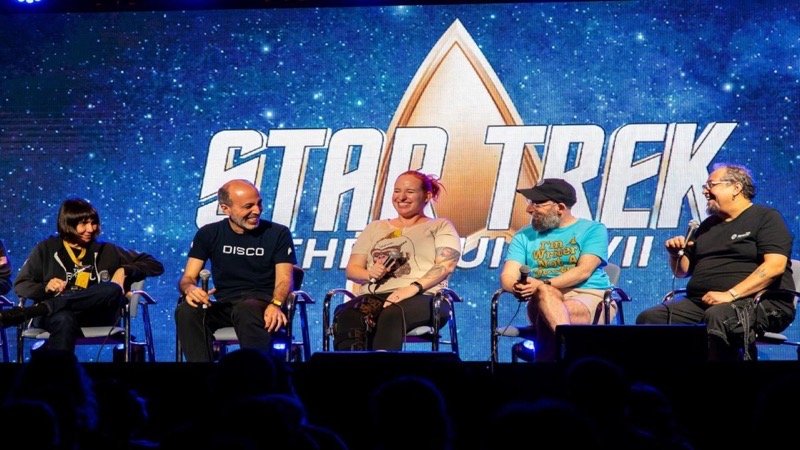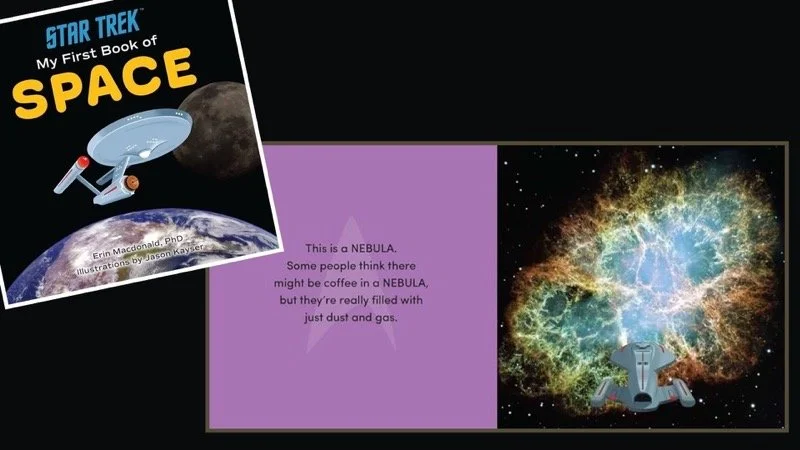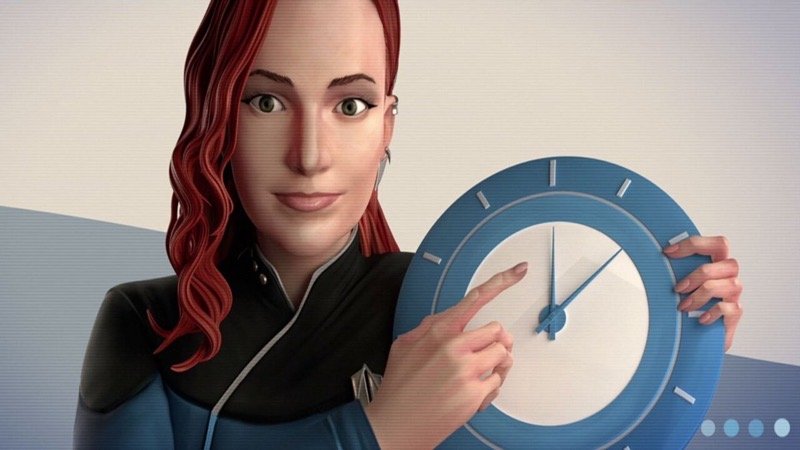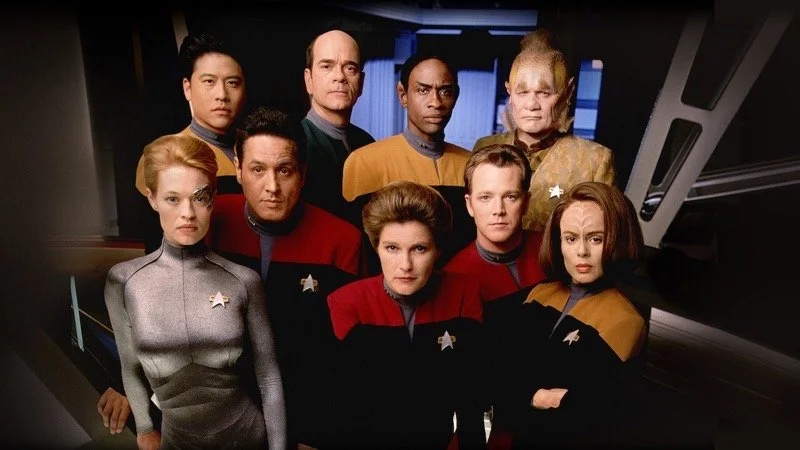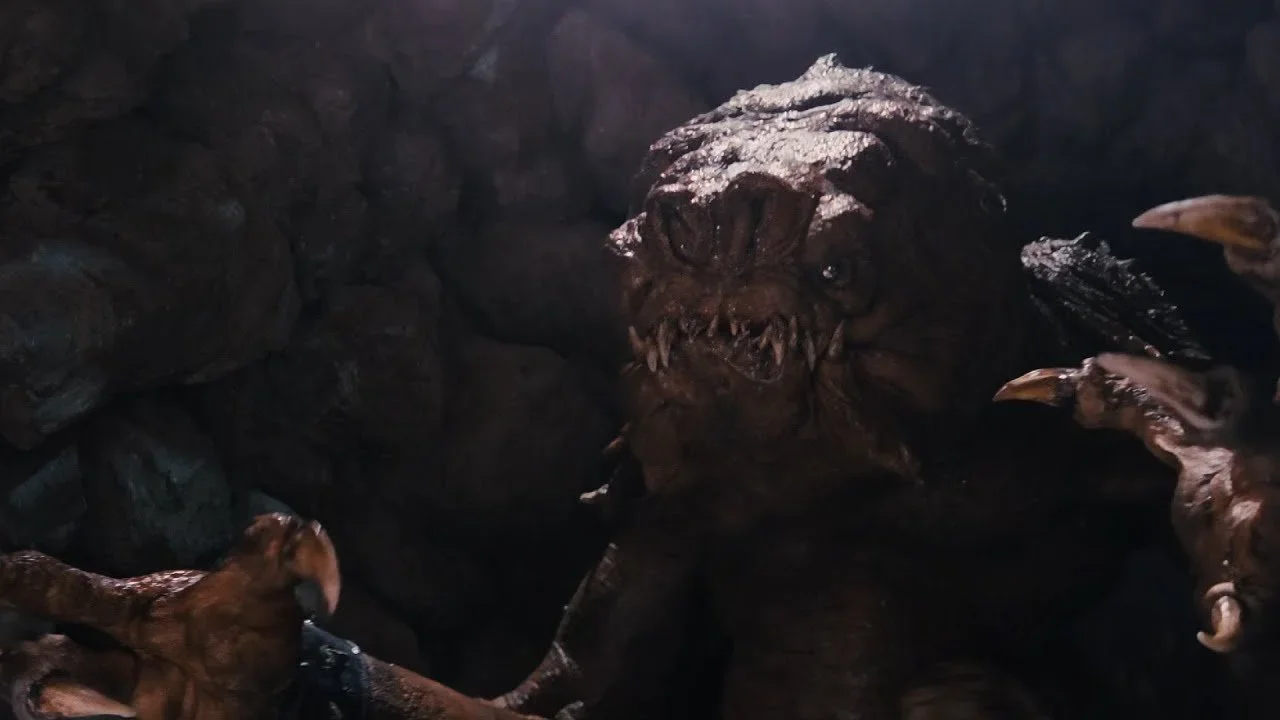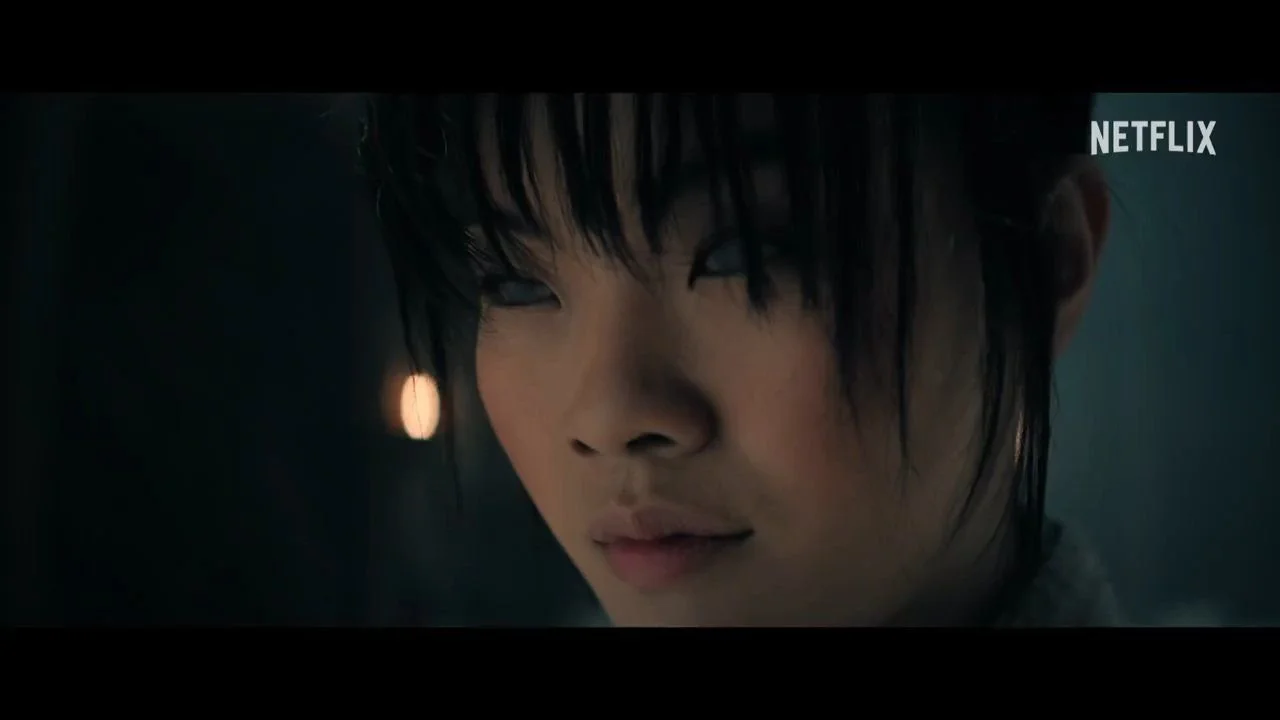Exclusive Interview With 'Star Trek' Science Consultant, Dr. Erin Macdonald
Image Source: CultureSlate
While at Dragon Con in Atlanta, Georgia over Labor Day weekend, we had the amazing opportunity to sit down with Dr. Erin Macdonald, an astrophysicist who is currently the Science Advisor for the Star Trek franchise. Dr. Erin has been canon since a mention in an episode of Star Trek: Lower Decks, “First First Contact,” and later began voice acting in Star Trek: Prodigy’s “Temporal Mechanics 101” as her in-universe self. Other Star Trek media to mention Dr. Erin include the Star Trek Online game and the comic Star Trek: Deep Space Nine- The Dog of War.
CultureSlate, Cate Feeney: We have Comic-Con: The Cruise coming up. What would you say are some of the biggest differences that you've seen between Star Trek: The Cruise and Dragon Con?
Dr. Erin Macdonald: Oh, that's a good question. Yeah, cause I'm not part of the Comic-Con cruise, right, but it's the same company and stuff. I would say, oh, it's so tricky, so I would say the biggest difference is obviously just the number of people. Even though there are so many events at Dragon Con, there's so many people to provide those events, whether it's the attending professionals or the guests or actors or whatever. They're not stretched for material, you know? All the tracks here are great!
RELATED:
The cruise, what they do that's so unique, is-- you know, there's only so many actors and people associated with the franchise and they have seven days, so they let us do a lot of different stuff. I did a whiskey tasting on the cruise, I did stargazing, and so being able to kind of do those. I know some of the actors, they'll do a play reading, or like, LeVar Burton did a short story reading. So it's just fun to be able to see some of those actors in that environment and have it be like 5% of the people that are in Dragon Con.
But, the similarities, it's like the party never stops, you know? I think that's unique to both the Star Trek Cruise and Dragon Con, compared to other conventions, is that the [other conventions] have halls that open at 10 and close at 7, and here it is just 96 hours of stuff going on.
CS: Do you feel like with the seven days [on Star Trek: The Cruise] sometimes it's almost too long or is that even preferable, because you get to spread out your energy and stuff like that?
EM: I don't really mind. If my schedule is well-paced, then it's not too bad. If I have one big-big day, then I can kind of burn out quickly, but what's funny is I usually get to the middle of Day 3 and I'm like, “Okay, we're wrapped, this is the end of a normal convention,” and it's like, “oh no, we're halfway through.”
CS: “You’ve had one port stop! We are continuing on…”
EM: Exactly! So, no, I think the seven days is great because it doesn’t-- you don't feel like you have to rush to see anything and cram everything in in only three days.
CS: What do you think is like your number one rule for someone going on a big convention cruise for the first time?
EM: Not so much a rule as much as I would just say, like, don't be afraid that it's going to be crowded everywhere. I think we [can] look at Dragon Con- we're here on Saturday, it's packed. Everyone in Atlanta comes out for Saturday day passes. On a cruise ship, there's only so many people and they do a great job about rotating events. So if you want to find somewhere where you can sit quietly, have a drink, not have to sit on the floor, not have to, you know, go back to your room, there's always somewhere that you can go and it’s quiet and chill. It's really nicely organized that way.
Image Source: Star Trek: The Cruise
CS: What message do you have for high schoolers who are interested in STEM, but they're not sure what they want to do once they graduate?
EM: Ooh, that was me. You know, I liked just studying space. I didn't go into getting an astronomy degree with the idea that I would be a professor or that I wanted to be a researcher. I went in because I thought space was cool and I think what's great is that, if it is a STEM degree, and you don't necessarily have a career plan, you do still have a lot of the skill set and the STEM degree will get you pretty far. So, as you go through your university career, you'll learn what you liked and you didn't like, and you'll start to hear more about different kinds of jobs. And so just let that steer you and give you options. And it might flounder a little bit, but at least you'll have the skills and the degree that you can kind of do a lot of different things.
Image Source: STEAM Powered
CS: How did you find out about and apply for the position as the Science Advisor for the Star Trek franchise?
EM: Yeah, it was not like an “indeed.com,” it did not have a job application. I actually got my start through conventions. I started at Dragon Con, they have a science track, they have a space track. I used to come and just give straight-up science talks. And then, being a nerd, I was like, “well, I want to go into the Trek track, and I want to go to the video game track, and I want to give talks at these.” So I started putting together “The Science of Star Trek: Physics and Faster-Than-Light Travel.” And, thankfully, the science track here has a really good ear for that kind of stuff, so they were really popular. This was sort of like 2015-2016, where we were getting conventions all over the country. So, I would take these talks to those conventions and again, just great responses.
I moved to Los Angeles, you know, life, the universe, and everything, I moved to LA. [I] had met so many people at conventions who were tangentially related to the entertainment industry, so they kind of got me in touch with friends, and buddies, and stuff. Then, through that, CBS heard about my “Physics of Star Trek” talks. And so they invited me to give my talks on their licensed events, which was, at the time, the Star Trek Las Vegas Convention and The Star Trek Cruise- again, wildly popular.
But then, when Michelle Paradise took over as showrunner for Season 3 of Discovery, she wanted to hire scientists to help with the stories. So I was on her radar, I was on the franchise’s radar, they knew they had a couple scientists in the wings-- It was actually another colleague of mine that I met at Dragon Con, who's a biology professor, he got the biology gig for it as well. I know she talked to a lot of people because you have to make sure that you have the right attitude when it comes to science advising.
I always say [that] a lot of people really want that job because they want to “well, actually…” all the stories, whereas it really is about saying, “yes, and…” [when] they bring you a problem. It's like, “okay, let's do it! Let's just make sure we don't say anything wrong, but, play with science.” It's fun! It's a creative job, so you have to have that kind of mentality.
CS: I love that! I was actually just at a different talk about creativity and how it applies to all areas of academia. We touched on literature, we touched on social studies and math, and we somehow didn't touch on science. In my head, I was like, “that's one of the biggest ones, like let's talk about that.”
EM: Yeah, absolutely!
Image Source: Star Trek: The Cruise
CS: What's your favorite technological advancement shown on Star Trek, and how close do you think we are to having that actively working in real life science?
EM: My favorite one is - probably a little cliche, but - warp drive. I did my PhD in general relativity, and so the idea of playing with space-time, being able to warp it, being able to build a bubble around your ship that carries you faster than the speed of light… you could do a five-year mission that's actually getting to go to places and see different places. And what's cool about warp drive is the math works. People have calculated the math, the equations, for how to warp space-time to push a ship faster than the speed of light. But there are unknown unknowns of how we can get to that point, because the math works, but we really don't have a handle on the energy required.
Some of it’s like negative energy, which is highly theoretical, some of it is just the sheer amount of energy required for warping space-time. We just don't have any capability for that, but discoveries are made every day, and if we are able to do that, that gets us one step closer.
Image Source: Star Trek: The Cruise
CS: So you mentioned your dissertation, I know that you thanked Janeway, Flogging Molly, Nightwish, among others. I’m a big heavy metal fan, so I was like, “oh my God.” Who would you like to add to that list of inspirations since you wrote that about 12 years ago?
EM: F*ck, it was 12 years ago? Jesus Christ.
CS: We can edit that part out.
EM: (laughs) That's okay, that's fine. That's my own time trauma, that's nothing I'm embarrassed about. You know, I think I didn't really reflect as much on the characters, the fictional characters that got me there. I thanked Janeway because she was literally a character who mentored me through my PhD. Because I didn't have a career plan, there were a lot of times where I was like, “why am I putting myself through this?” Getting a PhD sucks. It's not fun. And I didn't have a means to an end, a reason to push through. But I would watch Voyager and I would think [about how] Janeway would be really disappointed in me if I quit so…
CS: What would Janeway do?
EM: (laughs) What would Janeway do?
And so that was why I thanked her because it was so much more tangible and immediate. But as I've gone through and talked about career inspirations and looked at how media has influenced my life and my careers, I would go all the way back to Dana Scully. It's a little bit of a cliche because there's so many of us that were influenced by Dana Scully, but it's true! I loved that woman! I loved that woman. She really just presented a type of character on the screen.
I didn't have women in my life, necessarily, that I saw myself in, that I wanted to work towards, [that were] a mentor [for me], but I had those characters and they really were mentors for me. So Dana Scully would be mine, I would think. I still haven't met Gillian Anderson. One day, one day.
Image Source: Star Trek: The Cruise
CS: If there's any show on the air or not that you could be a part of, whether it's science consulting or voice acting, what would it be?
EM: Ooh, big fan of Loki! Yeah, I mean, it's kind of ended, but like…
CS: We never know!
EM: I love that show, I love that show! The TVA, the Time Variance Authority, it was just so good. And then just the fact that I played a time travel educator in Prodigy-- That was like, “I could be in Loki one day!” I love-- I know some people get wary of it, but I really do like playing with time travel stories because there is an art to it. And you have to make the audience feel like there was purpose to the story while not blowing everything up and making it too confusing.
Image Source: TrekCore
CS: Okay, so what was the biggest surprise of your career so far working for Star Trek?
EM: Honestly, the biggest surprise was probably me finally figuring out what I wanted to do with my life. (laughs) Yeah, it was a number of things that kind of happened around the same time. But you know, I got the Star Trek gig, I started doing it full-time. I quit my engineering job to focus on working on Star Trek and continuing science education, but I still didn't really know what I wanted to do. And as an astrophysicist in Hollywood, I'm like, “well, this is the gig! I'm working for Star Trek now, what do I do after this?”
I was able to do a Comic-Con panel with the former science advisors who were the advisors in the 90s, and they've gone on to be showrunners and executive producers and started writing. So I had that sort of inspiration from them, maybe that would be like a natural path for me as opposed to branding myself as a science advisor but [then] pivot into writing and storytelling.
So that was on my mind, and then I started working on Prodigy. You mentioned the Janeway [acknowledgment] in my thesis and I have a Voyager tattoo on my arm… and all I knew about Prodigy was that it was the kids’ Nickelodeon Star Trek show and I walked into that writer's room and they were like, “we hear you have a Voyager tattoo!” and I'm like, “oh no, I've been outed!” And they [said] “Ah, you're gonna want to sit down… cause Captain Janeway's coming back and we just signed Kate Mulgrew,” and I remember [thinking] I held it together, but then-- I was really cool in the room! And then I went back to my car and I cried. And then one of the showrunners told the story from his perspective at a recent panel. He was like, “yeah, she lost her mind.” Okay, so I wasn't cool at all, yeah, not cool at all.
But I remember that drive home from that meeting. Because, part of it, it wasn't just the Janeway of it all, but I [also] wasn't there to help do the science advising in that traditional sense. I was doing that, but the main reason they wanted to use me was to create Rok-Tahk [in Prodigy], who's a young girl who wants to be a scientist. They wanted to talk about my experiences, my perspective, all the education I've done, all of the kids I've interacted with… seeing what sparks kids' interests and how they navigate their path through finding their place in STEM [when] they know they like science, but there's a lot of different science out there. And so how do kids land on that?
So I got back to my car and I just wept openly. It was like “I'm writing lines for Captain Janeway” and “Captain Janeway’s real to me now!” But then I realized: I'm not meant to become Dana Scully or Captain Janeway. I’m meant to write those characters and create these characters that kids hopefully will see on the screen like I did and want to become a scientist through that. So it took like 30+ years, but I eventually figured out what I wanted to do with my career.
Image Source: Star Trek: The Cruise
CS: So then kind of going off on that, how did you get into writing for children and what inspired you to write the Star Trek: My First Book of Space?
EM: Well, my friend Robb Pearlman that I know from conventions, he was working on this children's book (‘cause they were gonna do them as a pair). So, they were trying to think of what else they could do and Robb has known me, knows my science communicating, and kind of approached me with the idea, and I was like, “heck yeah!”
Star Trek: My First Book of Space: it's the hardest thing I've ever had to write ‘cause it was 11 pages to explain space to a two-year-old, with Star Trek references in it, and that’s the brief! I was like, well, how do I explain-- What's the core that I try to impart on people that I feel like there's a lot of confusion [about]? And I always start with the cosmological address, so this idea that we have our address on Earth that you start with the number, and then a street, and the city, and the state, maybe, or county, and then a country. And we never say Earth, right? Because we’re all on Earth. But you can continue that: we’re Earth, in the Solar System, which is in the Milky Way Galaxy, which is in a local cluster of galaxies, which is in the Universe. And so just kind of doing that zoom out perspective, I think, helps anchor kids in where we are in space and what that means. So, that was kind of the direction I tried to go down, and then also just put a lot of Star Trek references in there.
Image Source: Amazon
CS: What do you feel like has been your favorite project that you've worked on, whether it's writing, or consulting, or your own production company? What do you feel like your favorite’s been?
EM: Oh, I mean there's been a lot but honestly, Prodigy is so close to my heart! It's so close to my heart, not just because of Rok-Tahk, but with Janeway and then just the storytelling that they did. And then to make me a character in it and put me in Star Trek canon?! There's just so many reasons for me to love it! And I had a great experience working on that show, you know, the showrunners, the writer's room-- It was just such a kind, safe, fun group of people to work with. I have nothing but good memories of working on Prodigy.
Image Source: TrekCore
CS: When Prodigy was taken off of Paramount, what was that like behind the scenes? I know that you guys were dealing with the protests for trying to bring it back and bring it to Netflix eventually, but what was it like for the writers, the producers, and everyone trying to figure out what the next move was?
EM: Yeah, I mean, I wasn't as clued into the business side of it all. But, you know, we had finished season two. The writing for that takes place years before the animation is even finished. So I hadn't even worked on Prodigy in like 2+ years. I was just seeing it come into the world, and seeing people's reactions, and how much I loved it, and finally being able to share it with people.
Honestly, just, emotionally, you know, Hollywood sucks. Like, it's a brutal- it's a brutal industry, and you know that going in, and you try to prepare yourself as much as possible. And it's so much rejection. It's really hard to impart on people how much rejection you have to deal with. And it's not that you get outright “no”s, it's that you get so many “maybe”s that are left dangling. So, for what they did to Prodigy, the fact that it was so sudden and I had gotten so attached to it… All I could think was, “you got too close, you fell in love, and you shouldn't have done that, that was a mistake.” Because I loved that show so much! So I'm just so grateful to the fans for voicing how much they loved it and not only getting it a home, but getting season two out into the world and being able to share that love with people. Yeah, it was tough, but it has a happy ending.
CS: Absolutely! Well, and we're so glad that it got closure! After seeing a lot of other non-Star Trek franchise shows like Firefly and Dresden Files get canceled after a season, you know, all of us were just sitting there going, “What happens next? What are we doing now?”
EM: I know! They just got to [Starfleet] Academy [at the end of Prodigy season one], no…!
CS: What are we doing now? And then we got to bring back more classic stars and just bring back more story lines, all of that stuff…
EM: Well, I think that's what I loved about it, too, was that it was like a literal spiritual successor to Voyager. Picard was more of-- season three of Picard was a direct sequel to the Next Generation. Prodigy was very much like the spirit of Voyager and it still had those actors and those stars in it that we love, but they weren't the point of the story, you know, we just got to see where they are and still have the heart of Voyager in it. And so that's, I mean, again, I'm just-- I'm a sucker for it.
CS: Voyager’s been my favorite. I'm showing my age, but when I was a kid, I went to sleep listening to the Voyager soundtrack… that became my studying music throughout high school, throughout college, was just throwing on Voyager in the background or throwing on the soundtrack and, like you mentioned, just getting me through the unknowns… It's been really interesting to see what series people take for inspiration. I know that so many of us saw so much in Janeway, and then we got Discovery, and then we got to, you know, see more female role models in Star Trek-- We were talking about the Next Gen panel earlier with Gates McFadden and just talking about how she's been an influence in everything, too...
EM: And what I liked about Voyager, too, is that it had multiple different women in STEM as characters. So, even Seven of Nine, like it was more about her journey of being a human, but she was still-- you know, she built the astrometrics lab! She was still a scientist!
B’Elanna Torres was the engineer and I remember going to-- in grad school, I was just obsessed with Janeway, but one of my closest friends was obsessed with B’Elanna Torres. She was an engineering physics major and she just resonated with that-- That's what I think is so great when you talk about representation is: the more you can have-- there's not just one person that all of the cultural identity needs to be associated with, and then they can have no flaws and they can't-- you can have a variety of underrepresented people that can then offer a lot to people.
Image Source: Netflix
CS: I know that you're a heavy metal fan. What heavy metal band would you love to see in the Star Trek universe and what kind of story would you want to write to incorporate them? Put them in a series specifically, if you want or not, you don't have to.
EM: That's so good. That's such a great question. I have to write that down so I can tell my husband that question, that's so good. I would-- I mean, Nightwish is my favorite band, so it has to be Nightwish. And the thing I love about Nightwish is, it's very theatrical and [it’s] story-telling music, so, it would have to be like a holodeck program. I mean, Nightwish had an album, I think it was called Story Time, or Imaginarium, that was all like the clowns, circus thing, and I'm not a big fan of clowns or circuses, but it would be a good horror holodeck program and really do a music theme.
CS: Where would you fit them in a Star Trek series, past or present?
EM: Yeah, I think it fits best in like Lower Decks, just for the chaos-- because they've already talked a little bit about their Klingon metal bands, and punk bands, and stuff, so yeah.
Image Source: TrekMovie
CS: Is there anyone you want to give a shout out to when this goes out or anyone else that you are really excited to collaborate with in the future, maybe?
EM: I think, just to thank Kate Mulgrew, honestly. She's just been such an ambassador for Janeway. I really see them as different people, like, she's not Janeway, but like to some extent, she understands the importance of Janeway, so she embodies it very well. She's been such a great ambassador for Prodigy, and really actively doing interviews, and telling people to watch it, and it's just nice to see someone of that caliber with such a commitment to a program that they've worked on and to just keep Janeway alive because she knows how much she inspires people, and, you know, that's just really nice. So I just want her to be my friend.
CS: She will totally be your friend. It might just take a little bit longer.
EM: We’ll go sit in an Irish pub somewhere. ⬛
READ NEXT:

